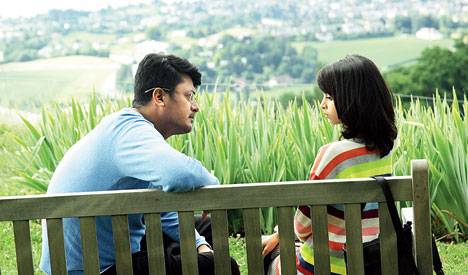-
Uma may have emerged from parental ambitions coming in — Srijit Mukherji
Apr 24, 2018
Sara and Jisshu Sengupta in Srijit’s Uma, which releases on June 1
Kya baat!” said Srijit Mukherji, settled in a comfy couch at a Lake Gardens studio, a five-minute walk from his home. The director was praising Anjan Dutt, who was dubbing for Srijit’s Ek Je Chhilo Raja. Sometimes he would ask Anjan to put in a ‘hmmm’, take a breath between sentences, or deliver a line a notch higher. Or, he may break into a smile, say ‘very good’, and just admire Anjan’s performance unfolding on the screen. t2 caught up with Srijit during lunch break…
Were you reacting like a fanboy?
No, no, not a fanboy. If you are one, you can’t direct. Even when I was working with Mr (Amitabh) Bachchan or Asha Bhosle (for Begum Jaan), I had to set aside my personal adulation. You have to work in a professional capacity. But if an actor delivers, I go all out to praise him.
Both you and Anjanda are quite finicky…
Yes, so, sometimes I say, ‘Anjanda, I have got what I wanted.’ And sometimes he says that he needs one more. Anjanda has a spontaneous, organic style of acting. It is insanely difficult to match his original energy. So he performs again (while dubbing).
April 13 was a red-letter day for you as you had two Poila Baisakh releases — cameos in Aami Ashbo Phirey and Kabir…
(Laughs out loud) I don’t know why producers aren’t making a beeline. I should have been flooded with offers by now!
The teaser for your next release Uma is already a hit…
The film has many characters and I have to give some space to everyone. I have distributed the characters over the teaser and the trailer. The concept of the film is that a city full of strangers come together to make a terminally ill girl smile. Which is why you see a montage of their faces.
Like all the gods were important in the creation of Durga — everyone had a weapon to give, everyone pulled in their energy — all these characters, like gods in a pantheon, contribute to the dream called Uma, which is another name for Durga.
Also, Jago Uma (that plays out in the teaser) is the song that captures the spirit of the film, of the city, and the people, who fight to create this impossible dream for the girl.
With the aerial shot closing in on the father and daughter, why did you go for close-ups of everyone?
At the beginning we see them very small. Then they keep getting bigger and a sense of anticipation and intrigue builds up. Also, if you look at the close-ups, they are not dead close-ups. They are turning to see someone, as if they are watching the father and daughter. So everyone is anticipating Uma. And the teaser ends just before we reveal Uma’s (Sara Sengupta) face.
Uma is based on the story of…
Evan Leversage. While I was preparing for Zulfiqar, I came across a news story on my Facebook timeline. I started reading up the related links and found out the incredible story of Evan, a terminally ill (Canadian) boy, who wanted to see Christmas. The doctor had said he would not live till Christmas. Not to take a chance, the entire town of St. George, every member, came together to create Christmas in the month of October. To the extent that they got a snow machine to make false snow… they got a reindeer, a Santa Claus, and got a Christmas parade going. An entire town came together to create something as wonderful and marvellous as this, for a stranger. I was moved to tears. And I knew at that moment I had to tell this story to a bigger audience. There I started building the Durga metaphor, changing Christmas to Durga Puja. The father (played by Jisshu Sengupta) and daughter stay in Switzerland, near the mountains. So Durga comes down from the mountains to the city.
The characters have mythological names. Anjanda is called Brahmananda, Rudranil is Gobindo. They come together to create Uma’s dream… that she gets to see Durga Puja. She wouldn’t survive till October, so they create it in the month of March. The father takes the help of an out-of-work filmmaker (Anjan Dutt), who conceptualises and executes the vision.
How is 2018 Srijit different from the one in 2012?
Lots of changes. I have seen death. My father passed away. I have had breakups, heartbreaks. I have had famous names betraying and reacting in a spineless manner. I have seen the ugly side of people. I have fallen ill, I have had accidents, I have had a brush with death. I have blood pressure and I take medicines every day. Changes keep on happening. And if the person changes, the films will change too. There was a dark period where I was writing stuff…
Rajkahini, Zulfiqar… that was very violent. So much so that I was starting to feel comfortable in that darkness. When I live these phases, they will reflect in my film. And maybe Uma happened because somewhere there are parenting ambitions coming in. Maybe the father in me, or my father, either of the two personalities started becoming big in my life. I am also getting old, shekhan theke thoughts about a child… all this might have contributed.
And your cinematic style has also changed…
These are not isolated things. These are extensions and expressions of the aesthetics of your personality, of your life experience, world view and politics. There will be a continuous reflection and change… see, I have long conversations with people who are critical of my work too. In fact, there is one guy whose movie I might be producing, who is exceedingly critical of my work, but I could learn from his criticism. Which is why he became so precious to me.
Was writing Uma therapeutic for you?
Very. When I was writing Uma, I felt the power of love and humanity.
Will you be screening the film in Canada?
I’ll be going to St. George with the film in July. Evan’s mother will come down for the premiere in June. Beside where Evan lived there is a park, I’ll be screening Uma in the park. Plans are on to release the film in the US, Europe, Canada and Australia. Australia is an emerging market for Bangla films.
Uma is an emotional story and the buzz is that this is your comeback.
For some it is a coming back. For some it is a going away also. People who loved Zulfiqar, who loved the massy, commercial Srijit Mukherji, who had considered him to be an aantel filmmaker only for the urban audience, for them it might be a going away also.
But you know what, there are certain emotions which are universal. Uma has a unique storyline, which is why maybe people feel I am coming back. But then Uma is nothing like whatever I have made before. So what is it that I am coming back to? There is no reference frame. And that has been my signature from Autograph. I have never stuck to one style. It’s a new ocean for me where I have set sail. I am a sailor at heart.
For the urban audience, there is Autograph, 22shey Srabon, Chotushkone. But when I go to shoot in Malda or Birbhum they call me Yeti Kaku. They call me Mishawr Kaku. They say, ‘When are we again getting a Markaz (from Zulfiqar)?’
Dev, Prosenjit, Nusrat have special appearances in Uma
Are you torn between these two selves?
I am not, the audience is. A man grows up through varying influences… some are expressed, some are not. My films celebrate my internal influences and differences and aspects and persona.
How do you deal with criticism?
I am not allowed to get affected because the moment I get criticism for Zulfiqar, I also get a lot of praise, in which the spellings might be wrong, the English might not be top-notch, but the feeling of adulation and praise is equally genuine, if not more. So that insulates me from the criticism. Who am I to say this audience is more gratifying than the other? I am not here to make value judgement. I will express myself. My films will find its own audience.
You mentioned that you take medicines every day. Do you listen to your doctor?!
I listen to my doctor… whenever I meet him (grins)! My astrologer friends tell me I don’t need to worry about anything, except for my health.
Your love life?
Not to worry. I just need to make time for my health!
Source : https://bit.ly/2HYgzI4



